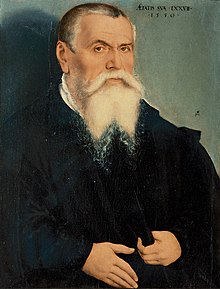Lucas Cranach the Elder
| Lucas Cranach the Elder | |
|---|---|

Lucas Cranach the Elder, Portrait at age 77 (oil on panel, 67 × 49 cm), Florence, IT: Uffizi Gallery, c. 1550.
|
|
| Born |
Lucas Maler c. 1472 Kronach |
| Died | 16 October 1553 (aged 81) Weimar |
| Known for | Painting |
| Movement | German Renaissance |
| Patron(s) | The Electors of Saxony |
 |
|
|
|
|
|
|
|
|
|
|
|
|
Lucas Cranach the Elder (Lucas Cranach der Ältere [ˈluːkas ˈkʁanaç dɐ ɛlˈtɛʁə], c. 1472 – 16 October 1553) was a German Renaissance painter and printmaker in woodcut and engraving. He was court painter to the Electors of Saxony for most of his career, and is known for his portraits, both of German princes and those of the leaders of the Protestant Reformation, whose cause he embraced with enthusiasm, becoming a close friend of Martin Luther. He also painted religious subjects, first in the Catholic tradition, and later trying to find new ways of conveying Lutheran religious concerns in art. He continued throughout his career to paint nude subjects drawn from mythology and religion. He had a large workshop and many works exist in different versions; his son Lucas Cranach the Younger, and others, continued to create versions of his father's works for decades after his death. Lucas Cranach the Elder has been considered the most successful German artist of his time.
He was born at Kronach in upper Franconia, probably in 1472. His exact date of birth is unknown. He learned the art of drawing from his father Hans Maler (his surname meaning "painter" and denoting his profession, not his ancestry, after the manner of the time and class). His mother, with surname Hübner, died in 1491. Later, the name of his birthplace was used for his surname, another custom of the times. How Cranach was trained is not known, but it was probably with local south German masters, as with his contemporary Matthias Grünewald, who worked at Bamberg and Aschaffenburg (Bamberg is the capital of the diocese in which Kronach lies). There are also suggestions that Cranach spent some time in Vienna around 1500.
...
Wikipedia
